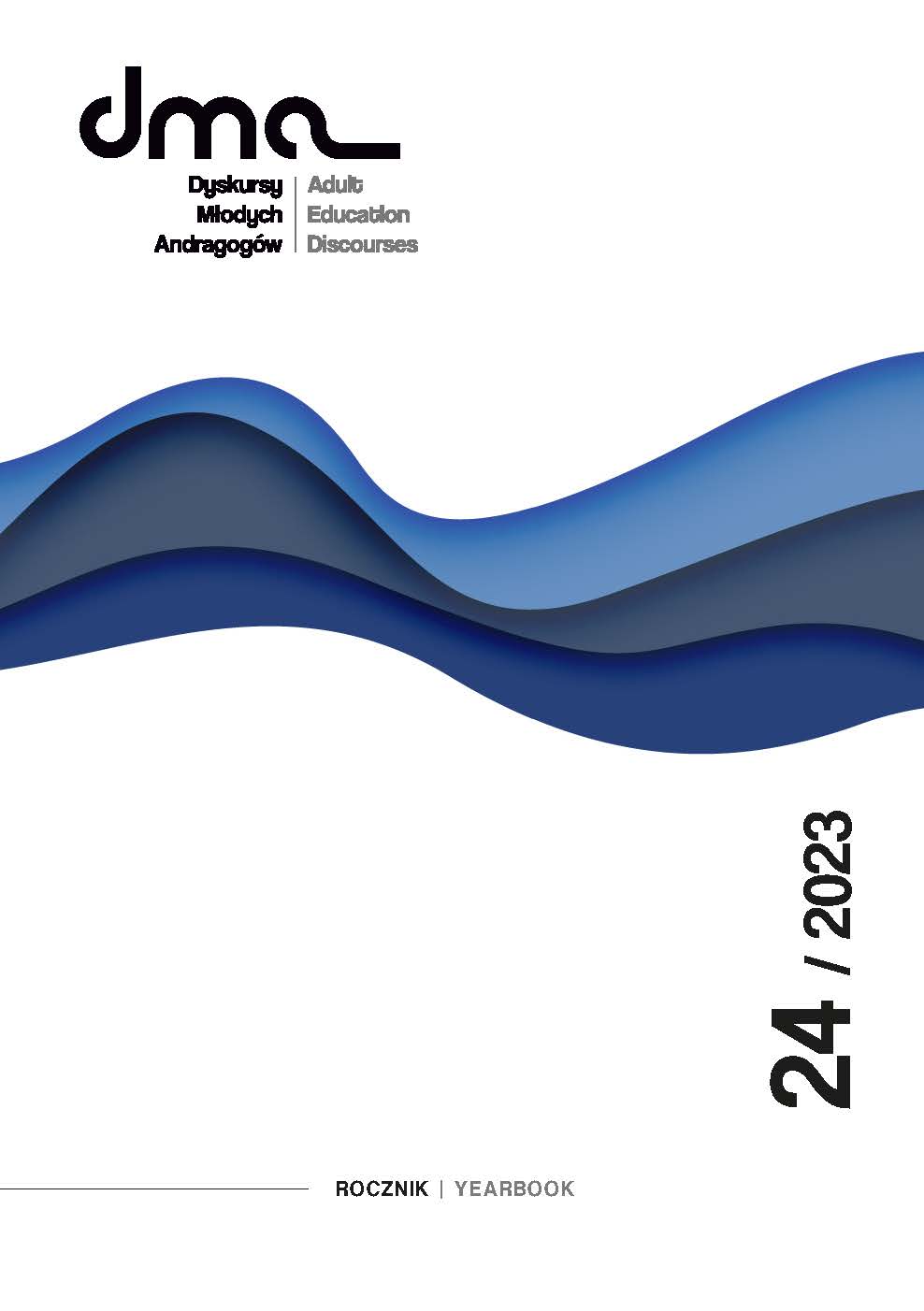Abstrakt
This article traces some of the major achievements of a local Taiwanese initiative – the Active Ageing Learning movement, which provides seniors with greater opportunity to engage in learning in later life, whether for expressive or vocational reasons. Taiwan has faced considerable increases in the numbers of older people proportionately in the general population as it moves from an “aged society” to a “super-aged society”. This article’s purpose is to provide a historical account of developments and challenges in senior learning as an example of an East Asian nation’s efforts to move away from social welfare paternalism to older citizens as active educative agents in a mainly post-work environment. Data were derived from a combination of document analysis of policy documents and research located within professional practice. The pathway towards a more sustainable learning society in which seniors play an important role has been met with resistance and has faced several challenges. In addition to analysing achievements, this article investigates these challenges and provides suggestions for greater clarity and integration of learning opportunities for elders in Taiwan. The article concludes that both challenges and successes need acknowledgment. As a major recommendation, in order to meet the demands of a super-aged society, Taiwan can profit from planning and implementing regional centres as sites of learning located conceptually and physically between top-down government-driven directives and more democratic bottom-up community-based initiatives. To be successful, such centres will require substantive training and development and a collective push from the state, civil society members and private enterprise.
Bibliografia
Biggs, S. (2000) Understanding ageing: Images, attitudes and professional practice. Buckingham: Open University Press.
Brookfield, S.D. (2006) The skillful teacher: On technique, trust, and responsiveness in the classroom.2nd edn. San Francisco: Jossey Bass.
Council of Indigenous People (2015) Culture and Health Station [online]. Available at: https://www.cip.gov.tw/zh-tw/news/data-list/6EBC9C8CB9DEF1E4/F3AE433808DA2375E92C4E62FD3681A7-info.html [15.04.2021].
Executive Yuan Agriculture Committee (2020) Green care in rural communities [online]. Available at: https://event.cw.com.
tw/greencare/[15.04.2021].
Field, J., Schmidt-Hertha, B. & Waxenegger, A. (eds.) (2016) Universities and engagement: International perspectives on higher education andlifelong learning. London: Routledge.
Findsen, B. & Formosa, M. (eds.) (2011) Lifelong learning in later life: A handbook on older adult learning. Rotterdam: Sense Publishers.
Findsen, B., Wei, H.C. & Li, A.T. (eds.) (2022) Taiwan’s Senior Learning Movement: Perspectives from Outside in and from Inside Out. Dordrecht: Springer.
Hakka Affairs Council (2017) Carry out the implementation plan of “Pak Gong Nursing Station” [online]. Available at:
https://www.hakka.gov.tw/Content/Content?NodeID=2782&PageID= 44518&LanguageType=CH [15.04.2021].
Hou, X. (2019) Five major crisis early warnings make the problem of aging a national security problem [online]. Available at: https://www.advisers.com.tw/?p=5921 [1.11. 2022].
Knowles, M.S. et al. (1984) Andragogy in action: applying modern principles of adult learning. San Francisco: Jossey Bass.
Langenbach, M. (1988) Curriculum models in adult education.Malabar, Florida: Krieger Publishing Co.
Laslett, P. (1989) A fresh map of life: The emergence of the third age. London: Weidenfeld & Nicholson.
Lin, Y.Y. & Huang, C.S (2016) Taiwan. In: B. Findsen & M. Formosa (eds.) International perspectives on older adult education: Research, policies and practice. Rotterdam: Sense Publishers, 421-431.
Makino, A. (2022) Learning as the key for the 100-Year life society: The experience of policy and practice in japan as a super-aged society. In: B. Findsen, H-C Wei & A.T. Li (eds.) Taiwan’s Senior Learning Movement: Perspectives from outside in and from inside out. Dordrecht: Springer, 81-93.
McClusky, H.Y. (1974) Education for ageing: The scope of the field and perspectives for the future. In: S. Grabowski & W.D. Mason (eds.) Learning for Ageing. Washington, D.C.: Adult Education Association of the USA, 324-355.
Ministry of Education (2008) The Ministry of Education subsidizes the municipal and county (city) governments to apply for the implementation plan of Le-Ling learning centers [online]. Available at: https://moe.senioredu.moe.gov.tw/Home/
Senior?side_nav=ContentSenior Center_1 [1.04.2022].
Ministry of Education (2020) Training points for Active Aging learning professionals [online]. Available at: https://moe.
senioredu.moe.gov.tw [15.04.2021].
Ministry of Health and Welfare (2016) Community Care Base (C-Class Lane Lane Changzhao Station) [online]. Available at: https://www.mohw.gov.tw/cp-3539-36790-1.html [15.04.2021].
Ministry of Labor (MoL) (2021) The labor status of the middle-aged and seniors (over 45 years old) in Taiwan in 2021 [online]. Available at: https://www.mol.gov.tw/1607/2458/2494/ 43308/nodelist [1.04.2022].
National Development Council (2020) Population Projection of Republic of China (2020-2070) [online]. Available at: https://
pop-proj.ndc.gov.tw/download.aspx?uid=70&pid=70 [15.04.2021].
Phillipson, C. (1998) Reconstructing old age: New agendas in social theory and practice. London: Sage Publications.
Short, T. & Harris, R. (eds.) (2014) Workforce Development: Strategies and Practices. Dordrecht: Springer.
Wei, H.C. (2012) Taiwan Active Aging Learning Intervention and Policy.Taipei: Ministry of Education.
Wei, H.C. (2015) Active Aging (Le-Ling) and Life-long Learning. Taiwan: Wunan.
Wei, H.C. (2016) Senior learning planner training program: 123 instructional design mode. Training & Development, Fashion Issue 221, 1-22.
Wei, H.C. (ed.) (2012) Taiwan Active Aging Learning Intervention and Policy. Taipei: Wunan.
Wei, H.C. & Li, A.T. (2014). Annual Report of Head Guidance Group Active Aging Learning Program. Taipei, Taiwan: Ministry of Education.
Wei, H.C. & Li, A.T. (2018) Annual Report of Active Aging Learning Head Guidance Group Program. Taipei: Ministry of Education.
Wei, H.C. & Li, A.T. (2022) Midterm Report of Active Aging Learning Head Guidance Group Program. Taipei: Ministry of Education.
Wei, H.C., & Lin, L.H. (2022) Bracing for the Super-Aged Society: A New Era for Active Aging Learning. In: B. Findsen, H-Ch. Wei & A-t. Li (eds.) Taiwan’s Senior Learning Movement. Perspectives from outside in and from inside out. Dordrecht: Springer, 125-137.
Wei, H.C., Chen, C.M. & Chen, G.L. (2017) Lo-Ling Learner’s Assessment of the Importance and Participation in Normative Need-Based Curriculum for Active Aging. Chung-Cheng Education Research.
World Health Organization (2002) Active Ageing: A policy framework. Geneva.
Xie, Lihui (2011) Xiao Wanchang: An aging population is a national security issue [online]. Available at: https://newtalk.tw/news/view/2011-11-05/19230 [1.11. 2022].
Yang, Yagi (2022) The disaster of Taiwan’s national annihilation: the soaring of the national security structure and the problem of long-term care of the second generation. letter media [online]. Available at: https://www.cmmedia.com.tw/home/articles/31592 [1.11. 2022].

Utwór dostępny jest na licencji Creative Commons Uznanie autorstwa 4.0 Międzynarodowe.
Copyright (c) 2023 Dyskursy Młodych Andragogów/Adult Education Discourses

 /
/  Język
Język
